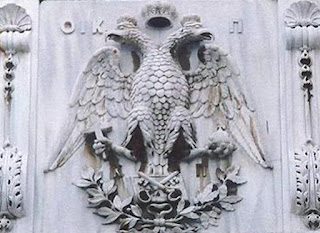The road to Avignon
leads through Switzerland
leads through Switzerland
The wandering Popes were only later called such when their destination was apparent. But for now we have the Latin Empire of Byzantium only approaching the boarders of France and Germany.
For the Hohenstaufen Emperor Frederick II the appearance of Batu Khan was a terrible loss of opportunity. Although the emperors in the West were bearing the title they didn't have the sovereignty, which was suggested by it. Not hard to establish this fact. They never coined gold!
With the fall of the Byzantine Romans and the establishment of the Latin empire of Byzantium he would have had the opportunity to establish such sovereignty, but Batu Khan's appearance on the scene made this impossible.
He was diplomatic enough to swiftly submit himself as did all the western monarchs. Yet they did this in such a way that they could maintain the state of affairs as much as possible.
The conversion of a possibly nestorian (arian) Batu Khan to a western form of Christianity was brought about by an encounter with St. Francis of Assisi, which brought about a whole new order in the West.
 For the western monarchs this was a dual power structure. Church and State. King and Emperor.
For the western monarchs this was a dual power structure. Church and State. King and Emperor. Of course for Batu Khan's usurped Papacy this wasn't about separation of powers. For which reason the Pope and the catholic Emperor clashed frequently.
A novus ordo had to be carved out and this extended the boundaries of the Great Empire further to include Germany and left Europe with only France, England and Portugal to be incorporated..
A new order needed a new financial basis and the popes continued to wander until such was established. And it was established in Switzerland.
Once that was a fact a new dynasty of western Emperors was needed to support that order of things.
This dynasty was the Habsburgs. Emperor Rudolf was the first in line to be crowned King of the Romans. Do note that he was not even crowned Emperor, he was King under the Great lordship of the Papacy.
And the Latin empire still was that of Byzantium. Frederick, though excommunicated, was still alive and the old Emperor of Byzantium still was Emperor in Nicea.
 |
| Rudolf I |
Only when in Europe the memory of a Great Khan in the East waded a substitute had to be created by historians and the idea of the great monarch = the great Khan - was transferred to 'Charlemagne', meaning just that: great Monarch. And of course this had to be in Aachen also!
With a new financial, religious en governmental order the golden Horde now had established itself firmly in almost the whole of Europe.
It will still take a few years to establish this order and then France could be taken on.
There were several obstructions for that. The Knights Templar were powerful in France and they represented the old financial order of Constantinople (a.k.a. Rome at the time).
Moreover France was a deeply religious country with many roots to the original Greek churches and deeply attached to a lively form of Christianity, believing that Jesus really was one of theirs.
With a new financial order under the Habsburgs the Templar really had to go. But King Philip was only prepared to do that if the Papacy made a firm statement in the direction of France.
That is Philip was only prepared accept the new order if the Pope would live on its soil. If only to keep an eye on him.
And the papacy was tired of wandering. And so the Papacy moved in to Avignon.
Bingo! The King France must have thought! With catastrophic consequences for the Knight Templar and those in France who had other religious ideas as those of the Pope.
If it weren't for England and Portugal that is. About the only two places in Europe which still had not entirely become dependent on the golden Horde.
England would be a harder nut to crack, because it had taken over the functions of the Byzantine Empire and many Byzantine high officials had fled there and became part of the nobility. England in so doing preserved the rich history and cultural achievements of Byzantium. And would remain in opposition to the Pope and the grand oriental order it represented for a long time.










